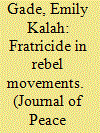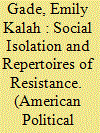| Srl | Item |
| 1 |
ID:
165996


|
|
|
|
|
| Summary/Abstract |
Violent conflict among rebels is a common feature of civil wars and insurgencies. Yet, not all rebel groups are equally prone to such infighting. While previous research has focused on the systemic causes of violent conflict within rebel movements, this article explores the factors that affect the risk of conflict between pairs of rebel groups. We generate hypotheses concerning how differences in power, ideology, and state sponsors between rebel groups impact their propensity to clash and test them using data from the Syrian civil war. The data, drawn from hundreds of infighting claims made by rebel groups on social media, are used to construct a network of conflictual ties among 30 rebel groups. The relationship between the observed network structure and the independent variables is evaluated using network analysis metrics and methods including assortativity, community structure, simulation, and latent space modeling. We find strong evidence that ideologically distant groups have a higher propensity for infighting than ideologically proximate ones. We also find support for power asymmetry, meaning that pairs of groups of disparate size are at greater risk of infighting than pairs of equal strength. No support was found for the proposition that sharing state sponsors mitigates rebels’ propensity for infighting. Our results provide an important corrective to prevailing theory, which discounts the role of ideology in militant factional dynamics within fragmented conflicts.
|
|
|
|
|
|
|
|
|
|
|
|
|
|
|
|
| 2 |
ID:
169072


|
|
|
|
|
| Summary/Abstract |
When rebels make alliances, what informs their choice of allies? Civil wars are rarely simple contests between rebels and incumbent regimes. Rather, rival militant networks provide the context in which these fragmented conflicts unfold. Alliances that emerge within this competitive landscape have the power to alter conflict trajectories and shape their outcomes. Yet patterns of interrebel cooperation are understudied. The existing scholarship on rebel alliances focuses on why rebels cooperate, but little attention is given to the composition of those alliances: with whom rebels cooperate. We explore how power, ideology, and state sponsorship can shape alliance choices in multiparty civil wars. Employing network analysis and an original data set of tactical cooperation among Syrian rebels, we find compelling evidence that ideological homophily is a primary driver of rebel collaboration. Our findings contribute to an emerging literature that reasserts the role of ideology in conflict processes.
|
|
|
|
|
|
|
|
|
|
|
|
|
|
|
|
| 3 |
ID:
172527


|
|
|
|
|
| Summary/Abstract |
Checkpoints in the West Bank’s Hebron Governorate represent Israel’s ever-present power over Palestinian civilians. Drawing on 71 interviews conducted during the Intifada of Individuals (2015), this article inductively builds theory about the relationship between social isolation and different modalities of resistance. Rather than forcing civilians to comply with the state, checkpoint apparatus instead change the nature and texture of resistance. I suggest that checkpoints structure social connections for civilians on the ground. Checkpoint apparatus which inhibit social connection engender a feeling of hopelessness and foster support for individual, often violent, resistance. Where checkpoints isolate a community as a whole but did not disrupt within-community social connections, citizens maintain hope for the possibility of change, which facilitates a preference for collective resistance. This article identifies troubling consequences checkpoints have on civilians and highlights how oppressive state power can limit some modalities of resistance only to engender support for others.
|
|
|
|
|
|
|
|
|
|
|
|
|
|
|
|